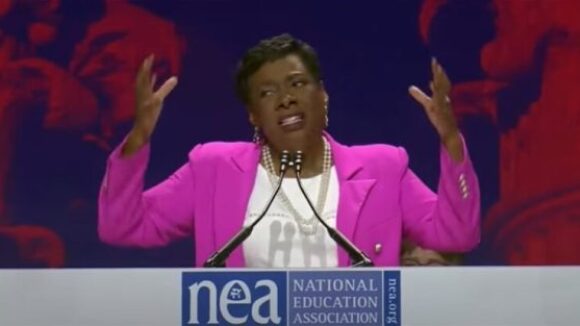Tyranny Triumphs in the Great Lakes State
Ignoring ample evidence of forced unionism’s unfairness and its damaging impact on jobs and incomes, Big Labor Michigan Gov. Gretchen Whitmer signed Right to Work destruction in 2023.
Government Union Czars Intend to Squelch Right to Work Momentum
(source: October 2014 National Right to Work Committee Newsletter)
It was 55 years ago last month that Wisconsin Democratic Gov. Gaylord Nelson, a former union lawyer and field rep for the Badger State affiliate of the American Federation of State, County and Municipal Employees (AFSCME), struck a major blow for government union bosses nationwide.
 On September 22, 1959, this dyed-in-the-wool Big Labor supporter put his signature on the first state law to be adopted anywhere in the U.S. explicitly authorizing and promoting monopolistic unionism in the government sector.
On September 22, 1959, this dyed-in-the-wool Big Labor supporter put his signature on the first state law to be adopted anywhere in the U.S. explicitly authorizing and promoting monopolistic unionism in the government sector.
To get this measure to the governor’s desk, then-AFSCME union President Arnold Zander and his cohorts in Washington, D.C., and Madison, Wis., had to agree to several compromises.
Among these, surely the most painful for union officials was the inclusion of a provision explicitly protecting public employees’ Right to Work regardless of union membership or fee payment.
Even without a license to force employees to bankroll union activities, the first state public-sector monopoly bargaining law quickly proved to be a boon for the AFSCME union hierarchy.
By early 1961, Wisconsin AFSCME locals were already collecting union dues from 25,000 workers, double the number of dues-payers of just a year earlier.
Government Union Chief Determined to Block Passage Of Any Additional ‘Act 10’s’
And just over a decade after its original passage, union lobbyists rammed through the Wisconsin Legislature an amendment to the monopoly-bargaining law abrogating the Right to Work provision in the 1959 statute and foisting forced dues as a condition of employment on state and local public workers.
Today more than 20 states permit, either by statute or through common practice, the firing of public servants for refusal to join a union or pay forced “agency” fees. But AFSCME and other government union bosses face a mounting challenge to their forced-fee and other monopoly privileges.
In early 2011, Wisconsin, of all places, became the first state in U.S. history to see a measure, known as Act 10, repealing government union bosses’ statutory power to collect forced dues receive legislative approval, be signed into law, and take effect.
While several states, including Indiana and Tennessee, have subsequently rolled back monopolistic government unionism, of the states with statutes permitting public-sector forced dues, so far only Michigan, which adopted a private- and public-sector Right to Work law in late 2012, has joined Wisconsin in repealing them.
(Unfortunately, both Act 10 and the Michigan Right to Work law exempt public-safety union officials.)
And Lee Saunders, who took the reins of the 1.6 million-member AFSCME union in 2012, is determined to ensure that no other public-sector forced-dues state follows suit.
In a Washington Post interview, conducted shortly after Labor Day, regarding the forced dues-fueled AFSCME political machine’s objectives for this fall, Mr. Saunders vowed to get revenge on Scott Walker, Wisconsin’s GOP governor, for prodding legislators to adopt Act 10 and for signing it into law.
“We have a score to settle with Scott Walker,” Mr. Saunders bluntly announced to the Post.
But punishing Gov. Walker and Lt. Gov. Rebecca Kleefisch (R) for daring to take away some of government union bosses’ special privileges is only one of multiple objectives for the AFSCME union elite in 2014.
Lee Saunders: I Will Deploy 40,000 Union Staff, Militants For Politics
As Mr. Saunders explained to Post reporter Matea Gold, this fall AFSCME will be pouring vast sums of money, most of it exacted from workers as a condition of employment, into state after state to elect Big Labor governors who will perpetuate forced unionism.
In the “run-up to November’s elections,” he added, the AFSCME union brass will have 40,000 professional staff and rank-and-file militants “deployed in key states,” and “focused both on gubernatorial and U.S. Senate campaigns.”
The AFSCME union political army will be doing voter I.D. and mobilization door-to-door and in workplaces as well as through phone banks.
All potential voters for pro-forced unionism candidates, and not just union members and their households, will be targeted.
And thanks largely to the forced-dues privileges they continue to wield in states where a majority of America’s state and local public servants are employed, AFSCME bosses can, to quote Ms. Gold, “muster substantial financial resources, at will.”
Act 10 Has Saved Wisconsin Taxpayers Roughly $3 Billion Since It Took Effect in 2011
During the 2010 midterm elections alone, Ms. Gold noted, AFSCME union bosses openly acknowledged pouring “roughly $90 million into local, state and federal campaign efforts.”
What is it about Act 10 that is so terrible as to prompt Lee Saunders and other czars of giant national unions to funnel so much forced-dues money into punishing Wisconsin elected officials who supported it and preventing similar reforms from being adopted in other states?
“The reality is, other than union kingpins, Badger State residents from all walks of life have benefited from Act 10,” said National Right to Work Committee President Mark Mix.
“Nonpartisan analysts essentially agree with Gov. Walker that Act 10 has saved taxpayers roughly $3 billion since it took effect.
“Meanwhile, the ability of the state and its localities to recruit and reward good public employees has actually improved.
“School districts, for example, no longer have to waste millions and millions of dollars buying overpriced health insurance from a teacher union subsidiary, because they no longer need teacher union bosses’ acquiescence to change their insurance providers.
“Teachers can thus get better health insurance at a lower cost, and the savings can be used for better purposes such as rewarding good teachers or reducing taxes.”
Mr. Mix cited a September editorial by the Wisconsin State Journal (Madison), which even as it fretted that Act 10 must be too “polarizing” because union bosses oppose it so vociferously, acknowledged that, under this law, “sought-after teachers across Wisconsin are now enjoying large pay raises . . . .”
Despite Act 10’s Success, Passing Similar State Laws in The Future Won’t Be Easy
“National Right to Work Committee members in Wisconsin who participated in the lobbying campaign to get Act 10 passed in the first place deserve part of the credit for these successes, as do National Right to Work Legal Defense Foundation attorneys who have helped defend the law in court,” added Mr. Mix.
“Of course, the recent citizen victories against government union monopolists in Wisconsin and a handful of other states like Indiana, Tennessee and Michigan have so far only modestly reduced the flow of money going into national union coffers extracted from public workers who would prefer not to join.
“Only if more and more states follow suit in revoking their government-sector forced-unionism laws and reducing the scope of (or simply eliminating) union monopoly bargaining over public employees will the inordinate power of Big Labor bosses like Lee Saunders be significantly reduced.
“And despite Act 10’s obvious successes, passing similar state laws in the future won’t be easy.
“In many states that are already reeling under the weight of unnecessary and wasteful public spending related to monopolistic government unionism, politicians in both parties still appear reluctant to do something serious about it by curtailing Big Labor’s special privileges.
“To help stiffen the spines of state candidates around the country, the Right to Work Committee is now mobilizing citizen activists to contact them and ask them to make public pledges, before Election Day, to stand up to government union bigwigs once they are in, or returned to, office.
“I am cautiously hopeful that, thanks to a combination of mounting public pressure and fiscal reality, several more state ‘Act 10’s’ will materialize and pass into law over the course of the next few years.”

Ignoring ample evidence of forced unionism’s unfairness and its damaging impact on jobs and incomes, Big Labor Michigan Gov. Gretchen Whitmer signed Right to Work destruction in 2023.

Largely thanks to the Right to Work attorney-won U.S. Supreme Court decision in Janus v. AFSCME, union bosses like NEA President Becky Pringle are no longer able to block virtually all meaningful education policy reforms.

Avelo employee Kim Howard believes all the firm’s flight attendants should get to vote on continued AFA rule. Credit: WTNH-TV (ABC,…